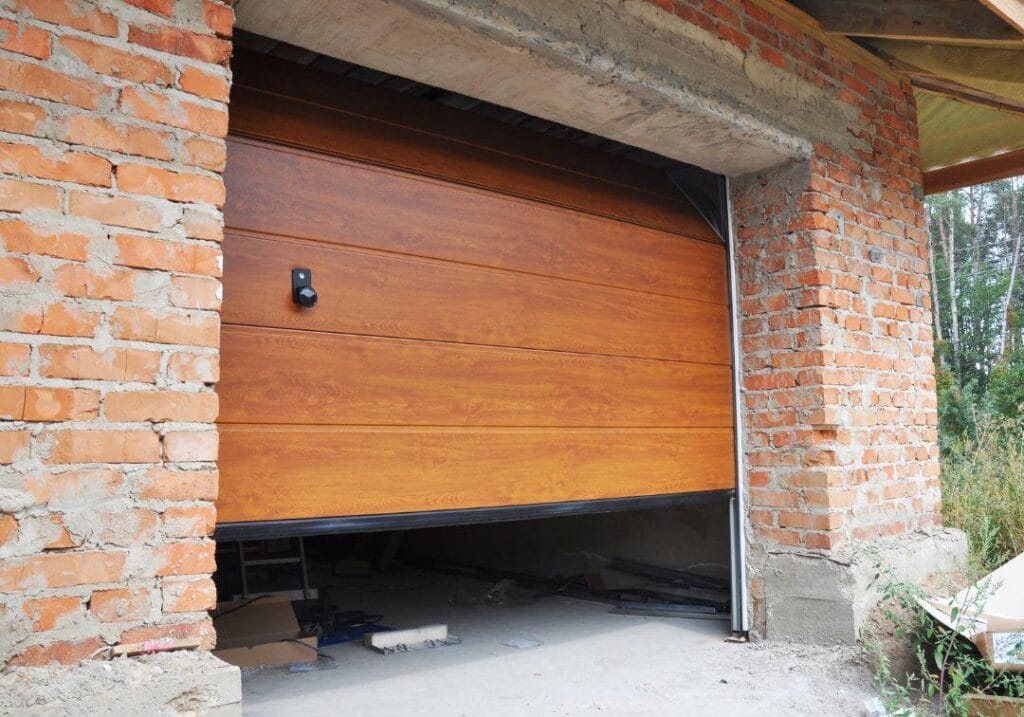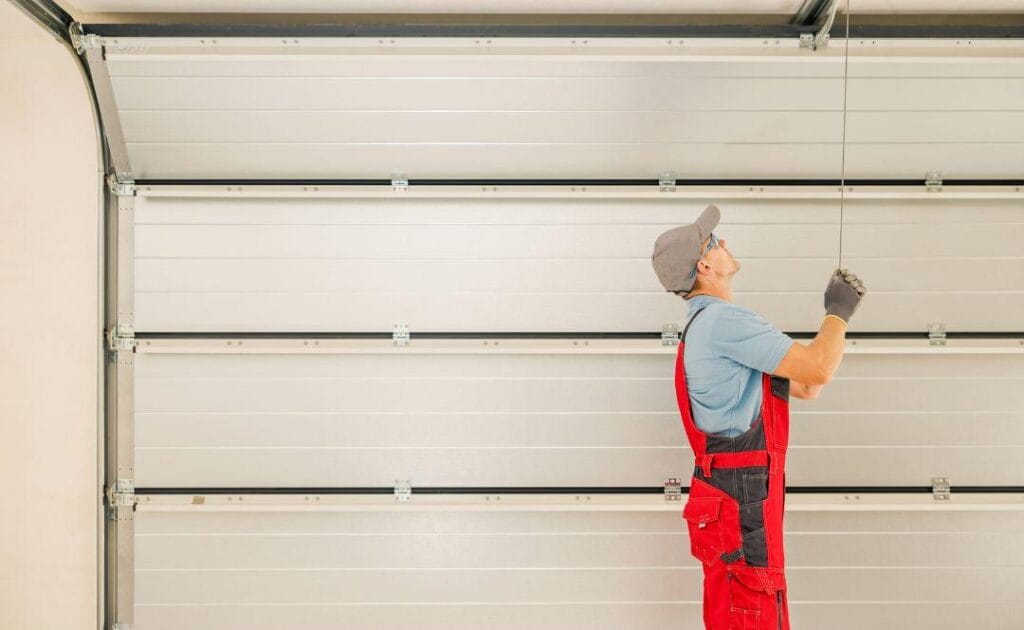Many people buy garage doors because they protect their homes and vehicles from harsh weather conditions.
In fact, it also plays an important role in living comfort, energy efficiency, etc. Insulated garages can affect the temperature, safety and long-term preservation of your stored items in the garage. For example, keep power tools and home fitness equipment in good condition.
So whether to choose an insulated garage door or a non-insulated garage door, we will compare them professionally below:

What exactly sets insulated and non-insulated garage doors apart?
A non-insulated garage door is quite basic. It consists of a single-ply aluminum or steel sheet. It is essentially a thin metal barrier between your garage and the outside environment. While it functions to open and close, it provides no thermal insulation or soundproofing.
Insulated garage doors are constructed with multiple layers, often featuring insulation materials such as polyethylene or polystyrene sandwiched between metal panels. This results in a strong obstruction that assists in temperature control as well as soundproofing.
To determine how effective the doors are, it is vital to understand the two key performance ratings:
R-value: It measures how well a material resists heat flow—the higher the R-value, the better the insulation.
U-value (or U-factor): This rating looks at the overall thermal efficiency of the entire door system—panel cover, frame, joint, hardware, and all. In this case, lower is better, since a lower U-value means less heat escapes.
The most common insulation materials used in garage doors:
Polystyrene: It’s a rigid foam that offers decent insulation at a wallet-friendly price. The thermal insulation performance can meet the needs of ordinary households and it is the material with the largest market share.
Polyurethane: Polyurethane foam is denser, stronger, and delivers superior insulation with higher R-values. It’s often injected as a liquid into the door, where it expands and bonds tightly to every nook and cranny. If you want maximum thermal control and noise reduction, this is your go-to.
How Garage Door Construction Impacts Insulation
Garage doors are different and built distinctively. Each type of door has its unique methods of construction, which determine their level of thermal insulation, sturdiness, and longevity. I will explain it for you:
Single layer Doors: They are the simplest type, consisting of a single steel or aluminum layer without insulation. These doors are cost efficient but do not provide effective heat and sound insulation.
Double Layer Doors : This option comes with an added layer of insulation with polystyrene on the front. A lot of these doors have a backing made of steel or vinyl which adds to the sturdiness and durability of the door. It’s a fairly priced door and in combination with the added liner, adds to the R-value.
Triple Layer Doors:They have thick insulation with either polystyrene or high density polyurethane between two steel layers. It features maximum insulation and energy efficiency as well as great strength. If you’re after long term value and serious performance, this is the gold standard. Of course, its price is also the most expensive.
The Case for Insulated Garage Doors: Key Benefits
Are you considering an upgrade to an insulated garage door? You are not only enhancing curb appeal; you’re also making a smart, forward-thinking investment. Let’s highlight the key advantages that explain why insulated doors are the preferred option for many homeowners.
- Year-Round Comfort
An insulated garage door acts as a thermal barrier between indoor and outdoor spaces, helping maintain a stable garage temperature regardless of extreme heat or cold.
- Quieter Living: Garage Door Rattles Be Gone
Who wants to listen to every single truck, barking dog, or noisy neighbor from their garage? Insulated doors mute many daily sounds due to their layered construction. They suppress vibrations during opening and closing too; no more thundering slams or noisy shudders.
- Built Tougher, Lasts Longer
Insulated garage doors are tougher since the additional layers of insulation enhance their strength. They are far better at resisting dents and dings as well as general wear and tear. This is especially useful if you have children playing in the driveway or unpredictable weather.
- Increase in Value of the Property Brought.
Lastly, upgrading to an insulated garage door not only enhances a person’s comfort today, but can also bring great value when selling the house. An eye catching and energy efficient garage door adds a lot of value for prospective buyers. It improves the curb appeal and adds perceived value of the property making the house even more marketable.
Insulated doors do have some drawbacks:
Higher Initial Cost: The most obvious one is the price tag. They cost more upfront than non-insulated doors. Sources mention an average cost around £1,200 (or $1,500).
Increased Weight: More material means more weight. This might mean you need a more powerful garage door opener. It could also make operating the door manually, say if the power goes out, more difficult.
Potential for Moisture Issues: In some climates, moisture may become trapped within the door’s layers, which, if unmanaged, can lead to mold or rust.
Limited Effectiveness with Frequent Use: If you’re opening and closing the garage door all the time, the benefits of that insulation are reduced. Every time the door opens, conditioned air can escape.
Lower Priority for Detached Garages: While still nice to have, insulation is less critical for a detached garage compared to one that’s attached to your house. A detached garage has less direct impact on your main home’s temperature.
PERKS OF CHOOSING NON-INSULATED GARAGE DOORS
Though insulated garage doors are more common than their uninsulated counterparts, the latter does have its advantages. For certain individuals, uninsulated garage doors can offer more value.
- Non-Insulated Garage Doors Are Affordable
If saving money is a priority, non-insulated garage doors can be a cost-effective choice. These doors have a much lower purchase cost from less complex manufacturing. This option benefits homeowners looking to upgrade their home or furnish their detached garage.
- Reduced Equipment Wear
Because non-insulated garage doors are lightweight, they are easier to operate. The lack of insulating material makes them less demanding, which in turn, makes the opener’s job easier. This will enhance moving part efficiency and reduce wear over time. This can contribute to reduced maintenance issues in the future.
- Maintenance Made Easy
Because these doors don’t have as many components and extras, repairs are cheaper and easier to execute. The practical pick is ideal for those who prefer a low-maintenance setup.

Limitations of Non-Insulated Garage Doors
Even though non-insulated garage doors are often budget-friendly and lightweight, they come with a few limitations.
- Insufficient Temperature Control
Lack of garages insulation features is a major disadvantage. If your garage is connected to the house, be prepared for constant changes in temperature.
- Unbearable Noise Pollution
If you live close to a busy street, or use your garage as an office or personal gym, noise from outside can seep in easily and non-insulated doors are not soundproof at all. Voicing any sound inside the garage amplifies the chances for carrying it out.
- Less Sturdiness
Like with every other budget option, non-insulated garage doors are typically constructed with a flimsy layer of metal which is more prone to sustaining dents, scratches, and general damage.
Making Your Choice: Key Questions to Guide Your Decision
How do you determine which type is best for your home? Consider the following questions based on your priorities:
- What is your local climate like? If you get really hot summers or really cold winters, an insulated door is going to be a much bigger benefit.
- How do you use your garage? Is it just a place to park the car? Or do you use it as a workspace, store sensitive items, or even keep pets there? The more you use the garage space, the more insulation makes sense.
- Is your garage attached or detached? An attached garage shares walls with your home, so its temperature has a bigger impact on your house’s energy use. Insulation is often more valuable in this case.
- What’s your budget, and are you thinking about long-term energy savings? Can you handle the higher initial cost for the potential of lower energy bills down the line?
- Are noise reduction or increased security important to you? Insulated doors offer benefits in both these areas.
Here’s an expert tip from one of the sources: If you answer YES to two or more of these questions (especially attached garage, extreme climate, using it as a workspace/storage, or planning to sell relatively soon), an insulated garage door is very likely a smart investment. It’s not just about comfort; it can save you money over time and boost your home’s value.
Final Thoughts: Is an Insulated Garage Door Worth It?
As it is true with most things, there is a cost-benefit analysis to make when it comes to insulation garage doors. Yes, there is a higher upfront payment, however; in the long run there are numerous benefits when it comes to functionality, soundproofing, and even insulation. Most homeowners find that spending the extra money is much more comfortable and practical in the long run.
Of course, these features add value to your home. It really boils down to your personal preferences, local climate, usage of the garage, and whether you consider it as part of the house, as a workspace, or a storage area.
We recommend discussing with your family to evaluate your lifestyle and needs. When you’re done, reach out to reliable manufacturers such as Grandsea who will guide you through the entire process without any hidden fees. They will make sure you get the best door fitted, all costs and benefits considered.


